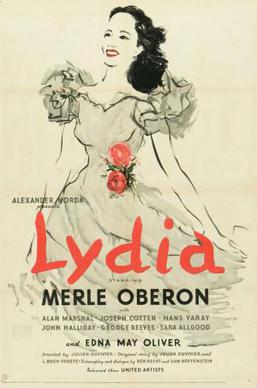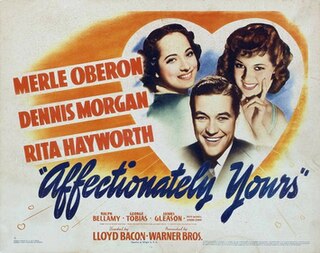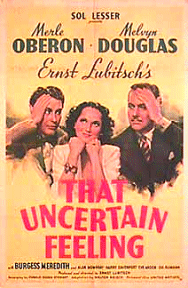
Merle Oberon was a British actress. She gained recognition for portraying Anne Boleyn in The Private Life of Henry VIII (1933) and saw further success with her role in The Scarlet Pimpernel (1934). She later travelled to the United States to make films for Samuel Goldwyn, including Folies Bergère de Paris (1935), The Dark Angel (1935), These Three (1936), The Cowboy and the Lady (1938), and Wuthering Heights (1939). Her performance as Kitty Vane in The Dark Angel earned her a nomination for the Academy Award for Best Actress.

The Dark Angel is a 1935 film that tells the story of three childhood friends, Kitty, Alan, and Gerald who come of age in England during the First World War. The script was written by Lillian Hellman and Mordaunt Shairp, adapted from the play by Guy Bolton. It was directed by Sidney Franklin, produced by Samuel Goldwyn, and released by United Artists. A silent film version of the same play, also produced by Goldwyn, was released in 1925 and is now a lost film.

The Divorce of Lady X is a 1938 British Technicolor romantic comedy film produced by London Films; it stars Merle Oberon, Laurence Olivier, Ralph Richardson and Binnie Barnes. It was directed by Tim Whelan and produced by Alexander Korda from a screenplay by Ian Dalrymple and Arthur Wimperis, adapted by Lajos Bíró from the play Counsel's Opinion by Gilbert Wakefield. The music score was by Miklós Rózsa and Lionel Salter and the cinematography by Harry Stradling.

These Three is a 1936 American drama film directed by William Wyler and starring Miriam Hopkins, Merle Oberon, Joel McCrea, and Bonita Granville. The screenplay by Lillian Hellman is based on her 1934 play The Children's Hour.

Hotel is a 1967 American Technicolor drama film, an adaptation of Arthur Hailey's 1965 novel of the same name. The film stars Rod Taylor, Catherine Spaak, Karl Malden, Kevin McCarthy, Michael Rennie, Merle Oberon, and Melvyn Douglas. It is directed by Richard Quine.

Wuthering Heights is a 1939 American romantic period drama film directed by William Wyler, produced by Samuel Goldwyn, starring Merle Oberon, Laurence Olivier and David Niven, and based on the 1847 novel Wuthering Heights by Emily Brontë. The film depicts only 16 of the novel's 34 chapters, eliminating the second generation of characters. The novel was adapted for the screen by Charles MacArthur, Ben Hecht and John Huston (uncredited). The supporting cast features Flora Robson and Geraldine Fitzgerald.

Lydia is a 1941 American romantic drama film directed by Julien Duvivier and starring Merle Oberon as Lydia MacMillan, a woman whose life is seen from her spoiled, immature youth through bitter and resentful middle years, until at last she is old and accepting. The supporting cast features Joseph Cotten, Edna May Oliver and George Reeves. The picture is a remake of Duvivier's Un carnet de bal (1937), which starred Marie Bell as the leading character.
The comedy of remarriage is a subgenre of American comedy films of the 1930s and 1940s. At the time, the Production Code, also known as the Hays Code, banned any explicit references to or attempts to justify adultery and illicit sex. The comedy of remarriage with the same spouse enabled filmmakers to evade this provision of the Code. The protagonists divorced, flirted, or even had relationships, with strangers without risking the wrath of censorship, and then got back together.

Why Did I Get Married? is a 2007 American comedy-drama film adaptation written, produced, directed, and starring Tyler Perry. It was inspired by Perry's play of the same name. The film also stars Janet Jackson, Jill Scott, Malik Yoba, Sharon Leal, Tasha Smith, Michael Jai White, Richard T. Jones, Denise Boutte, and Keesha Sharp. The film was released in the United States by Lionsgate on October 12, 2007.

Service for Ladies is a 1932 British comedy film, the second based on the novel The Head Waiter by Ernest Vajda. The film was directed by Alexander Korda and starred Leslie Howard.
The Cowboy and the Lady is a 1938 American Western romantic comedy film directed by H.C. Potter, and starring Gary Cooper and Merle Oberon. Written by S.N. Behrman and Sonya Levien, based on a story by Frank R. Adams and veteran film director Leo McCarey, the film is about a beautiful socialite masquerading as a maid who becomes involved with an unpretentious, plain-spoken cowboy who is unaware of her true identity. The Cowboy and the Lady won an Academy Award for Sound Recording, and was nominated for Original Score and Original Song.

There's Always a Woman is a 1938 American comedy mystery film directed by Alexander Hall and starring Joan Blondell and Melvyn Douglas. Seeing the potential for a series, Columbia Pictures quickly made a sequel, There's That Woman Again, released the same year, with Douglas reprising his role, but with Virginia Bruce as Sally. No further sequels were made.
Strange Evidence is a 1933 British crime film directed by Robert Milton, produced by Alexander Korda and written by Lajos Bíró and Miles Malleson. Starring Leslie Banks, George Curzon, Carol Goodner and Frank Vosper, it is a film made by Alexander Korda's London Film Productions at British and Dominions Imperial Studios, Elstree, with art direction by R.Holmes Paul.

Counsel's Opinion is a 1933 British romantic comedy film starring Henry Kendall and Binnie Barnes. It was one of three films directed in Britain in the early 1930s by Canadian-American Allan Dwan and was an early production from Alexander Korda's London Films. Counsel's Opinion was based on a 1931 Gilbert Wakefield play and was remade, again by London Films, in 1938 as The Divorce of Lady X starring Laurence Olivier and Merle Oberon.
Intimate Strangers is a 1977 American made-for-television drama film directed by John Llewellyn Moxey and written and produced by Richard and Esther Shapiro.

Affectionately Yours is a 1941 American romantic comedy film directed by Lloyd Bacon and starring Merle Oberon, Dennis Morgan, and Rita Hayworth. It was produced and distributed by Warner Brothers. Bette Davis was originally intended for the lead role but was replaced by Oberon.

Let's Get a Divorce is a 1918 American silent comedy film starring Billie Burke and written for the screen by husband and wife team John Emerson and Anita Loos. The film was produced by the Famous Players–Lasky company and distributed through Paramount Pictures. The film is based on the popular stage play Divorçons by Victorien Sardou and Émile de Najac.

On the Loose is a 1951 American drama film directed by Charles Lederer and written by Dale Eunson and Katherine Albert. The film stars Joan Evans, Melvyn Douglas, Lynn Bari, Robert Arthur and Hugh O'Brian. The film was released on September 28, 1951 by RKO Pictures.

There's That Woman Again is a 1938 American comedy mystery film directed by Alexander Hall. It is the sequel to There's Always a Woman, released the same year. In both films, Melvyn Douglas stars as a private investigator whose wife involves herself in his work. Joan Blondell played the wife in the first film, but that role went to Virginia Bruce in this one.
















